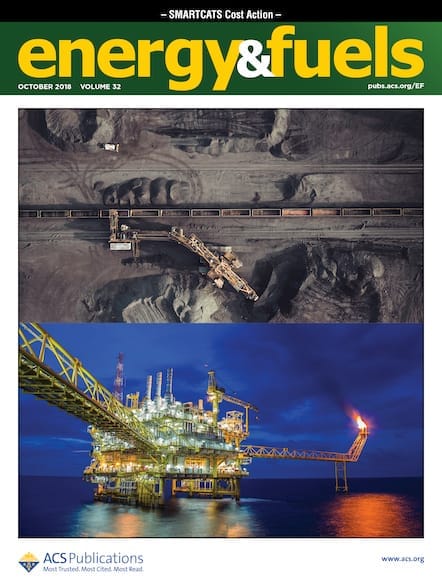The article “SOx/NOx Removal from Flue Gas Streams by Solid Adsorbents: A Review of Current Challenges and Future Directions” by Fateme Rezaei, Ali A. Rownaghi, Saman Monjezi, Ryan P. Lively, and Christopher W. Jones is the winner of the 2018 Energy & Fuels Joint Award for Excellence in Publication. Energy & Fuels and the ACS Division of Energy & Fuels sponsor this […]

The article “SOx/NOx Removal from Flue Gas Streams by Solid Adsorbents: A Review of Current Challenges and Future Directions” by Fateme Rezaei, Ali A. Rownaghi, Saman Monjezi, Ryan P. Lively, and Christopher W. Jones is the winner of the 2018 Energy & Fuels Joint Award for Excellence in Publication. Energy & Fuels and the ACS Division of Energy & Fuels sponsor this annual award, which honors an outstanding article published in the journal within the past five years.
“I’d like to congratulate the authors on this excellent award-winning paper that provides a critically-needed organization of the science and technology that underlies important energy conversion processes,” says Energy & Fuels Editor-in-Chief Michael Klein. “The paper will serve as a foundation for improved performance and environmental impact of essential energy scenarios.”
Corresponding Author, Professor Fateme Rezaei will present at an ACS Division of Energy & Fuels session in honor of the paper at the 2018 ACS Fall National Meeting in Boston, MA. Energy & Fuels and the Division encourage you to attend the session.
An Interview with the Winning Authors
I recently interviewed Fateme Rezaei to learn more about this award-winning paper, the challenges facing this field of research, and what this award means to the team. Here are the highlights of our conversation.
What prompted your team to work on this project?
Fateme Rezaei: Public concern related to air pollution and related environmental problems has led many scientists around the world to investigate new pathways for flue gas cleanup through development of more efficient materials and processes. Flue gas cleanup by adsorption has been shown as a promising route to address the drawbacks of current technologies, both economically and environmentally. The motivation behind this work was to critically analyze the status of research in this direction with the focus on adsorbent materials, adsorption mechanisms, and the open problems to be solved, among which is the need for rational design and creation of new materials with desired physical, chemical and structural properties that lead to better cleanup performance compared to the current state-of-the-art materials. Another important aspect of SOx/NOx removal is the way that these impurities influence downstream CO2 capture systems. Given that currently there are considerable research efforts being devoted to development of efficient CO2 adsorbents, it is imperative to take into account their tolerance to flue gas impurities such as SOx and NOx compounds.
What are the major challenges still facing this field?”
Fateme Rezaei: Most of the adsorbent materials developed to date have shown efficiency toward adsorption of SOx/NOx gases; however, realizing the advantages of adsorption-based flue gas cleanup technology using these materials requires overcoming several barriers to allow for practical utility. The greatest barriers to the application of solid adsorbents for flue gas cleanup are their lack of long-term stability, their narrow range of useful operation conditions, their high costs of synthesis and the ability to remove multiple impurity gases simultaneously. In addition, the most of the current CO2 adsorbent materials are not resistant to the trace amounts of SOx/NOx impurities that typically exist in the flue gas streams. Despite many recent advances, much of the potential remains untapped and needs to be explored. Novel materials such as MOFs or organic-inorganic hybrid materials appear to have many of the hallmarks of high-performance adsorbents. Nevertheless, more fundamental and applied research is required for these advanced materials to find wide-spread use in adsorption-based flue gas cleanup processes.
Our team is currently focusing on developing novel adsorbents for simultaneous removal of SOx, NOx, and CO2 from flue gas. Indeed, there is potentially significant gain towards capital, operating and energy requirements through the use of advanced materials with the ability to remove multiple flue gas impurities.
What does it mean to your team to be awarded 2018 Energy & Fuels Joint Award for Excellence in Publication?
Fateme Rezaei: This award will keep the group move forward with future research endeavors and encourage the team to continue making significant contributions to the field of energy and separation processes.
